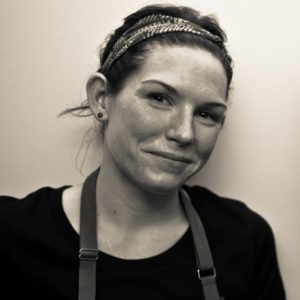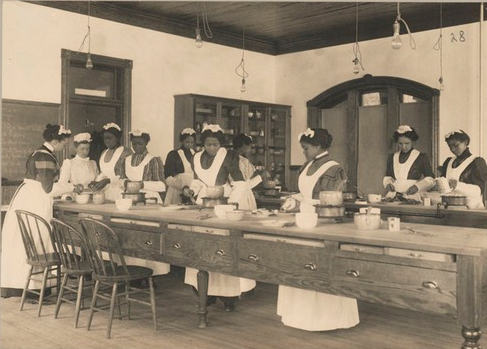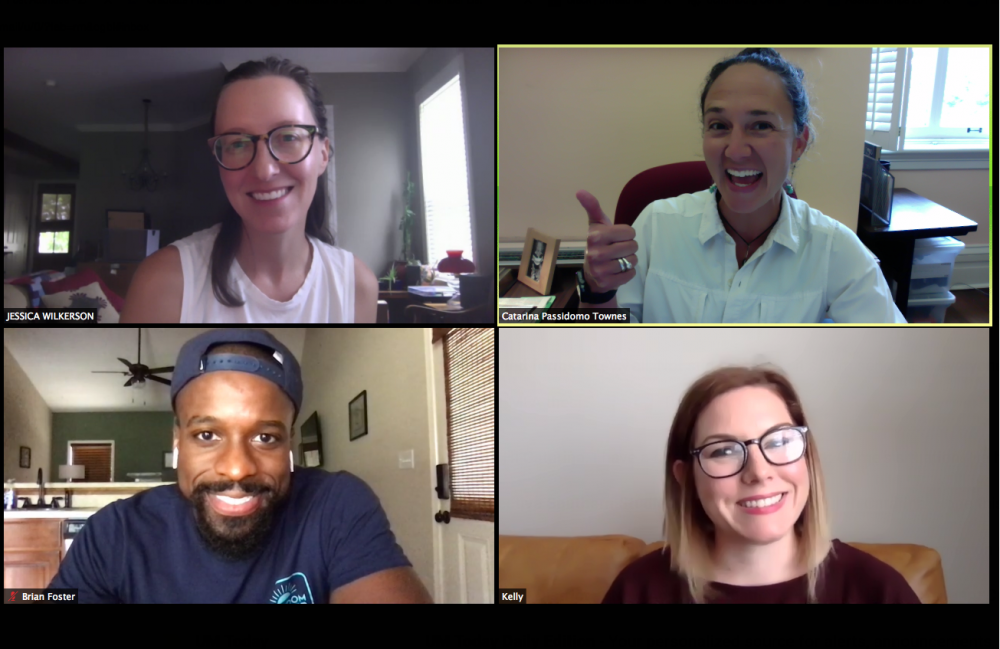From Pastry Chef to Student: Kelly Spivey Studies Baking and Gender in the South
Her research and writing focuses on baking, gender, labor, and race
Written by Rebecca Lauck Cleary
Kelly Spivey learned about adaptability and instinct from cooking in restaurants, and decided to exchange her rolling pin for stack of textbooks. She turned those skills into a backdrop for her academic studies as a graduate student in the Southern Studies master’s program.

After earning a B.F.A. in photography from the Savannah College of Art and Design, she was a pastry chef at multiple James-Beard nominated restaurants, including The Grey in Savannah, Georgia, and Coquette and Compere Lapin, both in New Orleans. These experiences sparked her current research, which focuses on baking and pastry within Southern foodways, and gender within the domestic and professional kitchen spaces.
Although Spivey didn’t attend culinary school, she learned valuable techniques by watching her mother and grandmother bake at home.
“I read cookbooks and spent my spare time practicing techniques,” said Spivey, a native of North Carolina who now resides in Memphis. “I learned on the job, with chefs that challenged me. I knew that technical knowledge and instinct worked side by side but I always felt that technical knowledge was given more value. I was frustrated with the way baking was framed as an ‘either/or’ and wanted to better understand why. I also wanted to give space to the idea that it could be both instinctual and technical.”
She was also intrigued with the prospect of studying Southern foodways in a serious way.
“I have always been interested in the history of baking in the South and wanted to study baking the same way things like barbecue are studied,” Spivey said. “When I was working at The Grey, I spent a lot of time researching historically Southern recipes to include on the menu. We were in a building that had history and Mashama [Bailey] has a personal history with Savannah. Food was a way for me to connect that history to the present.”

“The ability to take risks and find creative solutions to problems is invaluable,” Spivey said. “You also have to learn to work within the constraints you are given. Those are skills that have been extremely helpful in my academic work.”
Her thesis, “Raised in Their Mothers’ Kitchens”: The Southern Evolution of Domestic Science,” involved a great deal of archival work, as she studied cookbooks, oral histories, government documents, letters, diaries and newspapers.
“Initially I was interested in how women learned to bake and why that skill would need to be standardized,” Spivey said. “My focus was on the Progressive Era but as I researched, I found more and more precedent for the tenets of domestic science within the social upheaval of the Reconstruction South. Thinking about domestic science in the context of the South reframes it in a way that allows larger questions about the way we process cultural change through food.”
On June 30, Spivey had a successful Zoom thesis defense with advisor Catarina Passidomo and committee members Brian Foster and Jessie Wilkerson.

Spivey’s academic interests dovetail with her professional experiences, lending her study a unique perspective, Passidomo said.
“Kelly’s thesis analyzes the emergence and evolution of professional baking among women and its intersection with late 19th and early 20th century conceptions of femininity,” Passidomo said. “Such a project is potentially quite broad in scope, but Kelly was able to focus her study by tightly adhering to particular theoretical framings. In addition to her academic accomplishments, Kelly has been a tremendous asset to Center programming through her work with Afton Thomas and former graduate director Jessie Wilkerson.”
For Spivey, one of the biggest benefits of the program is the interdisciplinary structure, which allows freedom to find the best method for your chosen topic.
Although due to COVID-19 it was difficult during the last few months to be without the in-person camaraderie she was used to, she said a remote defense was slightly less nerve-wracking since she was able to be in her own space.
Spivey said the master’s program challenged her in ways she hadn’t anticipated, but she liked it so much that she decided to stay another year and earn her Master of Fine Arts in Documentary Expression beginning in August.
“Going through the archives in my thesis research, I found that information about baking was sparse,” Spivey said. “I’d like to continue my work by contributing to the archive. The skills that were once required of bakers are generational. I think we need context for the directions in historical cookbooks and the best way to get that is to go to the source—the women who baked those recipes. My hope is that I can add to the archive in a way that might help other scholars understand references they come across.”
Passidomo said she is pleased Spivey is continuing with her studies.
“I’m excited to see how she continues to develop her ideas through documentary expression, and I’m grateful she will continue to work as a graduate assistant with Afton and myself,” Passidomo said.
